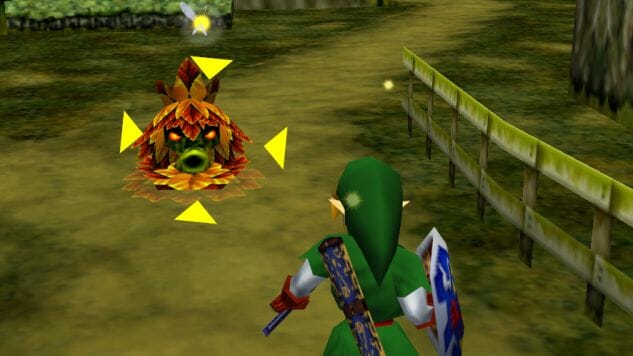When I first played The Legend of Zelda: Ocarina of Time, I was fascinated by the concept of Z targeting. Videogames were only just entering the third dimension, and players like myself had to adjust to an entire new perspective. Many design innovations popped up to help us transition to the new control structure, like the omniscient multi directional camera support of Lakitu in Super Mario 64. In Ocarina of Time, Z targeting was Nintendo’s way of teaching us how to maneuver around enemies and interact with NPCs and objects in 3D spaces. With a press of the Z button on the underside of the controller, Link would lock on to a target, allowing the player to strafe, flip, dodge and thrust, all without losing track of their opponent.
Z targeting made an otherwise elusive way of thinking easier for me to grasp. They say that women have poor spatial reasoning, and while I’m not sure how much I believe that (there’s evidence that this enduring stereotype, though rooted in scientific research, is tainted by bias in the testing process), I know it’s something I struggled with myself when I was younger. I found it difficult to think in such a way that encouraged me to pivot myself as the center of the space around me. The Z targeting system, in its ability to guide me through the logistics of negotiating the game’s depth of field, challenged that.
As I’ve grown older and made the effort to improve my ability to conceptualize 3D perspectives in virtual environments, I’ve wondered, bitterly, if women really do have trouble with spatial reasoning, and if so, if it’s possible that our social conditioning plays a part. Few of us are taught to be the center of their own universe, instead learning to be more concerned with the needs of others, particularly men, than we are with our own. Perhaps in the absence of our own sense of self, we lock into something else to focus on, even as it remains stationary, refusing to let go.
It’s an obtuse theory, more of a metaphor (or even a projection really), but one that resonates with me. I have a tendency to Z target on an immovable object and dance around it, whether I get any feedback or not. It most often happens in romantic relationships; when I encounter emotional withholding, my insecurity kicks in and I start to work for a person’s affections. In the process, I end up blaming myself for a lot of things that aren’t my fault, desperately strafing for a redemptive explanation that will assure me that if I just do all the right things, I won’t be rejected again. This is as much because of the gendered conditioning that taught me to overcompensate with emotional labor as it is my fear of failing in love again. I become just like Link, honed in magnetically to an NPC or a Gossip Stone or some other immobile object indifferent to the energy I spend hopping and somersaulting around it. Only Kid Link doesn’t have a stamina bar, and I do. I’m exhausted.
Sometimes I think it must be very easy to have an awareness of the immediate space surrounding you when you think the whole world revolves around you anyway. I know how bitter that sounds. But I suspect my inability to assert myself sometimes comes from the fact that (thanks to years of conditioning by people who demanded my physical and emotional servitude) I barely know how to be motivated by own personal benefit. I’m still not comfortable with healthy selfishness, and it manifests in so many ways. The Gossip Stone might be stationary, but for all my thrusts, strafes and parries, I’m the one going nowhere.
The amazing thing about Z targeting, though, is that it has a button. And once you learn to trust your own perspective, you don’t have to press it anymore. You can just release it, and be secure in the knowledge that even if you can’t always control the scenario, you can still adapt to it and recover quickly. I may not be there yet myself but I do know one thing. Z targeting can encourage me to let go, even though it taught me to hold on.
Holly Green is the assistant editor of Paste Games and a reporter and semiprofessional photographer. She is also the author of Fry Scores: An Unofficial Guide To Video Game Grub. You can find her work at Gamasutra, Polygon, Unwinnable, and other videogame news publications.
